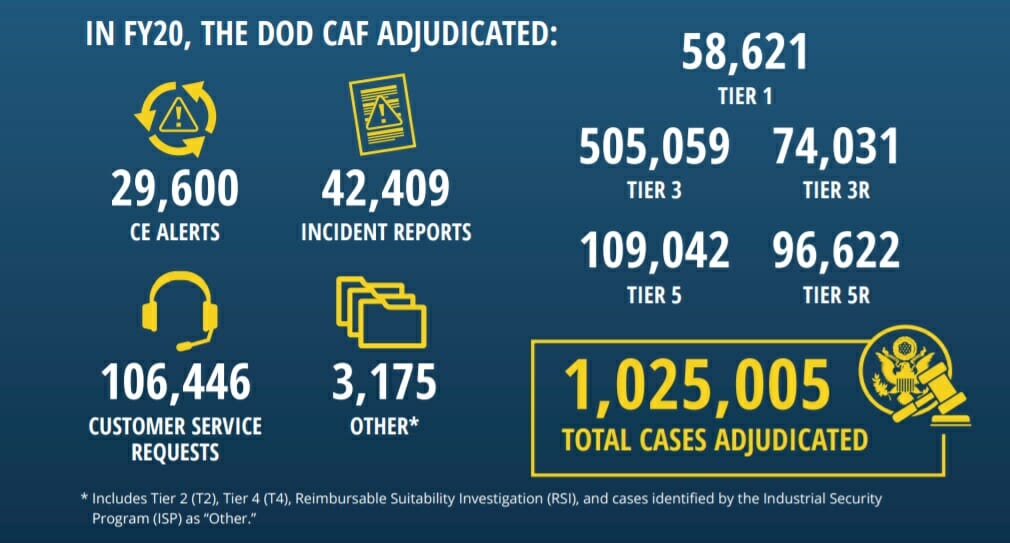Realignment is nothing new for the Department of Defense (DoD) Consolidated Adjudications Facility (CAF). In 2011 Base Realignment and Closure (BRAC) brought together 10 adjudication facilities into one home and consolidated umbrella in Fort Meade, MD. And despite the DoD name and primary mission the DoD CAF continues to serve a growing numbers even as it establishes itself within the newly formed Defense Counterintelligence and Security Agency (DCSA). This year it released its first annual report, released this week.
DCSA has been all about process improvement in its quest to overhaul and improve the security clearance process, and the DoD CAF has been on a similar journey. The report notes the CAF launched six Lean Six Sigma studies and completed three. Reciprocity, the Continuous Evaluation Program, and Adjudicator Training Programs were all key initiatives and improvements addressed in 2020. The emphasis on training and process improvements together are credited for many of the DoD CAF improvements made in 2020, and to be implemented in 2021.
Reciprocity and Continuous Evaluation continue to be critical issues for security clearance applicants and the defense industrial base. In the second quarter of Fiscal Year 2021 process improvements and specifically consolidating the adjudicative decisions within the DoD CAF is expected to shorten current reciprocity averages from 6 to 2 days.
The sheer number of cases adjudicated is significant, and in addition to initial clearance eligibility, also includes CE alerts, incident reports, and reinvestigations.
DoD CAF is the only adjudications facility that serves all three branches of government, from Dod soldiers to White House staffers and Supreme Court clerks. With so many different customers to serve and mission areas, DoD CAF has still been able to reduce inventory by taking advantage of case optimization, process mapping and decision trees, and other efforts around improving the process to ensure timeliness metrics are met. In 2020, timeliness metrics were met for all Tier 3 and Tier 5 investigations.
Second Focus: Mental Health
The report also highlighted the 2020 focus on mental health awareness within the DoD CAF. While those efforts went virtual along with 100% of the DoD CAF staff, they remained available to answer questions and provided a variety of virtual resources for agencies to reassure cleared professionals and applicants that seeking mental health treatment is not an issue in a security clearance determinations. With the strain of a year of COVID-19 still affecting the national security workforce, DoD CAF resources help reassure cleared professionals that it’s okay to need help, and it’s okay to get help.
The report ended with a note about return to work operations for DoD CAF as more offices open and agencies seek to create a new normal post-COVID.
” The desired end state is that the workforce safely returns, that our mission-essential functions are maintained without interruption, and that our supporting functions and tasks are restored,” the report stated.





